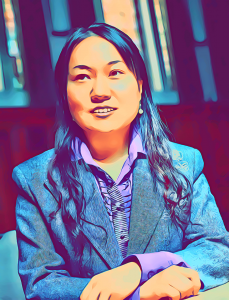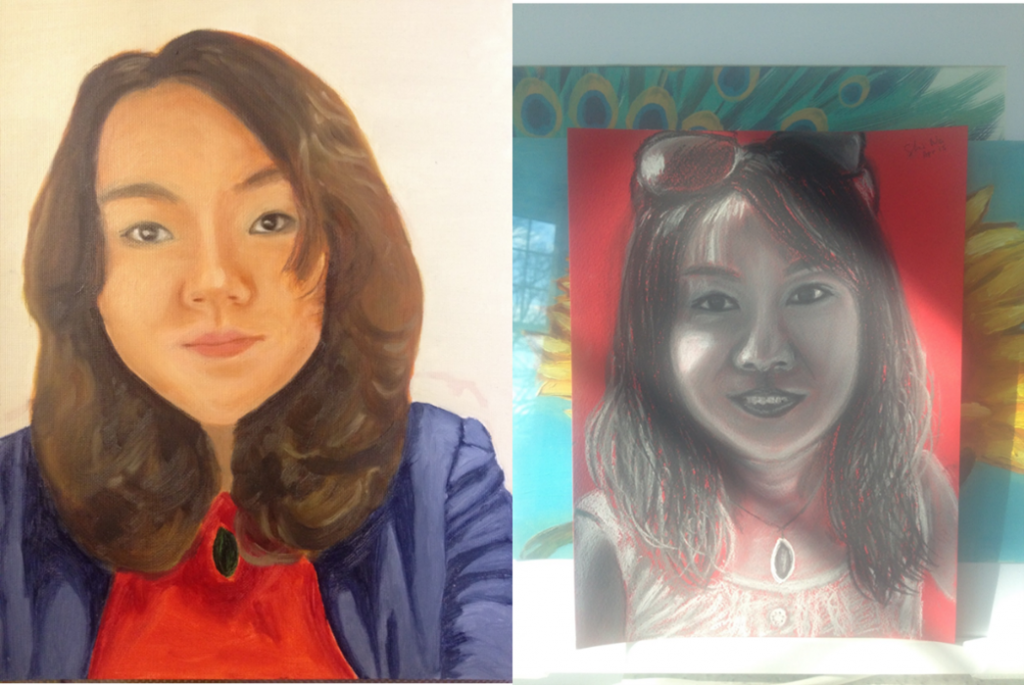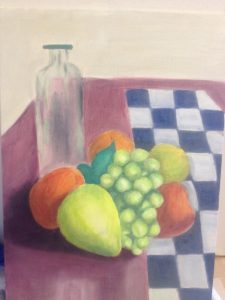163 Letter from ShiNa Li

Dear Early-career Women Tourism Researchers,
It’s my honour to write this letter to you, which is also a reflection on myself. Over the years, I have reflected on myself through drawing or painting self-portraits using various media. On the left is an oil painting and on the right is a charcoal pencil drawing.
You must have learnt a great deal from your mentors and supervisors on how to conduct good research. Here are my top three key words: focus, passion and patience. I would like to explain their significance by sharing some personal examples.
Developing your main research focus(es). One of the key suggestions that I received from my mentors over the years is to concentrate on one or two main research areas and to become an expert in these areas. However, this may seem hard because there are always numerous interesting research topics to distract us. After listening to my heart about my true passion, I decided to focus on tourism economics and psychophysiological research in the tourism and hospitality field.
Regarding tourism economics research, I first combined the econometric and CGE modelling methods to evaluate the economic effects of tourism brought by large events, on-screen products and crises. This combination of methods can improve the accuracy and reliability of model results by overcoming the weaknesses of each method. For this methodological innovation, I received a British Academy Quantitative Skills Acquisition Award from the British Academy. Applying this approach, I have published several papers on the evaluation of the economic impacts of the 2008 Beijing Olympics, on-screen tourism motivated by The Lord of the Rings and The Hobbit, China’s supply-side structural reform, and the 2008 financial crisis. I have also extended the literature on behavioural economics in tourism by examining the joint effects of framing and mental accounting on residents’ behavioural intentions regarding public health policies to reduce the social costs of tourism, applying framing and anchoring to explore tourists’ money illusions, and evaluating the framing effects of messages and images on willingness to pay for pro-poor tourism products. Regarding psychophysiological research in the tourism and hospitality field, I am applying electroencephalography (EEG), electrodermal analysis (EDA) and eye-tracking to examine the spillover effects of commercial advertising on tourism promotional videos and evaluate the appreciation of traditional arts events. Adapting psychophysiological measures to tourism and hospitality studies is likely to lead to the generation of new theories. For example, by clarifying the relationship between brain activity and behaviour, EEG can be used to formulate new hypotheses.
A passion for your research topic. When I conducted research on economic impact of on-screen tourism, using The Lord of the Rings and The Hobbit as case studies, I not only showed great interest in applying economic modelling to assessing their impact but I also developed a passion for the research subject, the films and their characteristics. For example, I drew Gandalf and made a poster for this research. My passion for the topic encouraged me to think deeper.
Being patient in designing and conducting your research. Research students often ask about the quickest route for research and publishing. I cannot answer this question, as I think that good research takes time to design, conduct and refine, and that this process provides the opportunity to improve one’s research capabilities. When I applied computable general equilibrium modelling to analyse the role of tourism in supply-side structural reform in China, my initial plan was to conduct an analysis only at national level, which of course would be a relatively quick path to publication. However, to enhance the model’s explanatory power and improve the findings’ reliability and comprehensiveness, I spent more than two years patiently building more than 30 Computable General Equilibrium models for each province in China.
Finally, I present my oil painting of delicious fruits in wishing you a fruitful future on the pathways of research, career and life.
ShiNa Li
School of Tourism Management, Sun Yat-sen University, China




